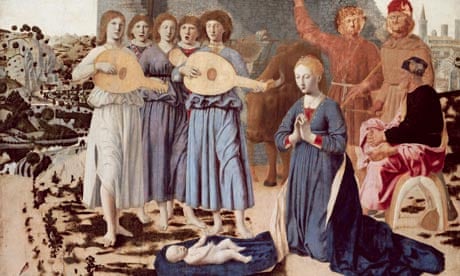The legend that cattle – descendants of the beasts that knelt in reverence at the stable in Bethlehem – would kneel each Christmas Eve at midnight was familiar to Hardy from childhood. He uses it in Tess of the D'Urbervilles, in a rare moment of comic relief: when Tess arrives at Talbothays looking for work as a milkmaid, Dairyman Crick relates the story of his friend William Dewy, walking home to Mellstock late at night after a wedding. Crossing a field, he is chased by a bull: "The bull seed William, and took after him, horns aground, begad; and though William runned his best, and hadn't much drink in him ... he found he'd never reach the fence and get over in time to save himself." But William has his fiddle with him and, as a last resort, takes it out and plays the bull a jig. "The bull softened down, and stood still, looking hard at William Dewy, who fiddled on and on; till a sort of a smile stole over the bull's face." But as soon as he stops playing, the bull advances again, and eventually he has almost depleted his stock of tunes to play. "Well, then he called to mind how he'd seen the cattle kneel o' Christmas Eves in the dead o' night. It was not Christmas Eve then, but it came into his head to play a trick upon the bull. So he broke into the 'Tivity Hymn, just as at Christmas carol-singing; when, lo and behold, down went the bull on his bended knees, in his ignorance, just as if 'twere the true 'Tivity night and hour. As soon as his horned friend were down, William turned, clinked off like a long-dog, and jumped safe over hedge, before the praying bull had got on his feet again to take after him. William used to say that he'd seen a man look a fool a good many times, but never such a fool as that bull looked when he found his pious feelings had been played upon."
Twenty-four years – and the death of Hardy's first wife, which brought forth a torrent of poetry from him – separate Tess and "The Oxen". It was written in 1915, in the midst of the carnage of the first world war (a distant relative of Hardy's was killed at Gallipoli that year). Hardy had long since lost his early religious belief – until the age of around 25 he had seriously considered a career in the church – but in the 16 lines of this poem he encapsulates beautifully the urge to faith that persists even in the face of all better judgment.
Fittingly, it turns on a memory from credulous childhood, a time when it would not "occur to one of us there / To doubt they were kneeling then". The poem's third stanza, with its abrupt caesura in the second line, enacts memory's attempt to bridge the gap between maturity and childhood innocence:
So fair a fancy few would weave
In these years! Yet, I feel,
If someone said on Christmas Eve,
'Come; see the oxen kneel . . .'
Just like William Dewy's bull, children's pious feelings can be played upon too. For the 75-year-old Hardy, looking back, there's a clear parallel between the hushed children sitting "in a flock" round the fireside and the "meek mild creatures ... in their strawy pen". But the grown man knows that if there is any transcendent power at work in this world it is callously indifferent to human concerns, like the President of the Immortals who has his sport with Tess. Yet, burdened by inescapable memory, faced with the inevitable prospect of extinction, we persist in wanting to hold on to that "fair fancy", the pretty lie of the Christmas story – and that is our distinctively human tragedy.
The Oxen
Christmas Eve, and twelve of the clock.
"Now they are all on their knees,"
An elder said as we sat in a flock
By the embers in hearthside ease.
We pictured the meek mild creatures where
They dwelt in their strawy pen,
Nor did it occur to one of us there
To doubt they were kneeling then.
So fair a fancy few would weave
In these years! Yet, I feel,
If someone said on Christmas Eve,
"Come; see the oxen kneel,
"In the lonely barton by yonder coomb
Our childhood used to know,"
I should go with him in the gloom,
Hoping it might be so.

Comments (…)
Sign in or create your Guardian account to join the discussion